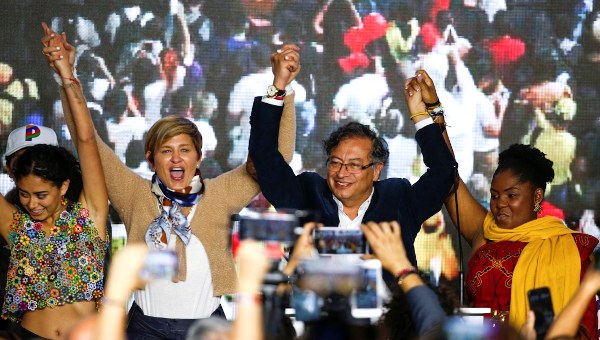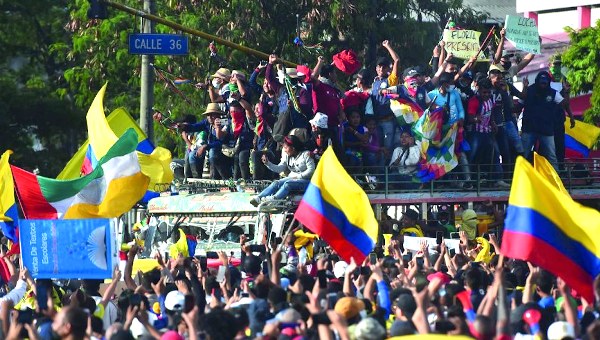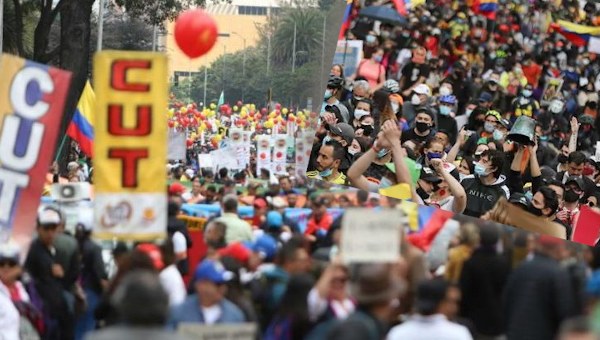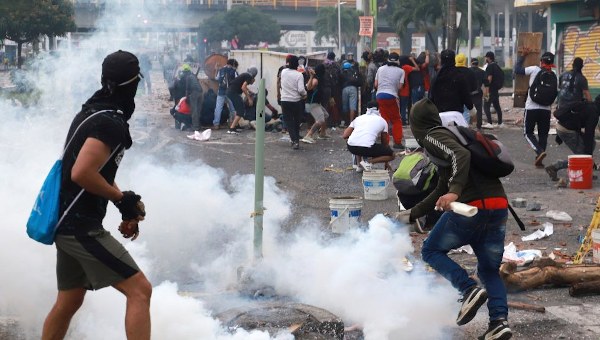Colombia and Venezuela Rattle Their Sabres: Uribe’s Parting Shot
Outgoing Colombian President, Álvaro Uribe, dropped a figurative bomb in the Andes on Thursday, July 22, just weeks before the scheduled inauguration of President-elect Juan Manuel Santos, Uribe’s former Defence Minister. At the behest of Bogotá, an extraordinary session of the Permanent Council of the Organization of American States (OAS) was convened to hear Colombia’s accusations that there are “1,500 guerrillas and dozens of encampments of the Revolutionary Armed Forces of Colombia (FARC) and the National Liberation Army (ELN) in Venezuela,” both groups deemed to be “terrorist” organizations by Colombia and the United States.
In response, Venezuelan President Hugo Chávez – flanked by visiting Argentine soccer sensation and leftist celebrity, Diego Maradona – announced on Venezuelan television that he had cut all diplomatic relations with Colombia.
The Venezuelan embassy in Bogotá was closed and Colombian diplomats in Caracas were given 72 hours to vacate the country. The Venezuelan armed forces, particularly those 20,000 troops stationed along the Colombian-Venezuelan border, were put on “maximum alert,” given the gravity of the accusations levelled against Venezuela by the Uribe government. Chávez accused Uribe of using the alleged guerrilla encampments as a pretext to bring the two countries to war.
Luis Alfonso Hoyos, the Colombian Ambassador to the OAS, demanded that Venezuela allow an international team of inspectors into its territory to investigate the supposed encampments. “In the name of dignity,” Chávez said, “I see it as an obligation to totally break diplomatic relations with sister Colombia, and this breaks my heart.”
The Imperial Response
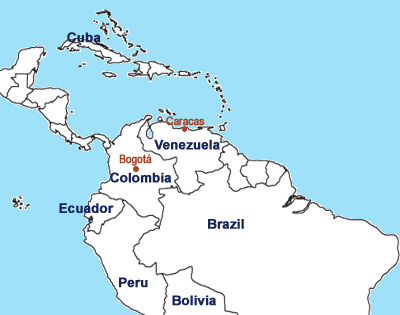
A US State Department release immediately proclaimed that “Colombia’s allegations need to be taken very seriously.” It was clear to the Obama administration that, “Venezuela has an obligation to Colombia and to the international community to fully investigate this information and move to prevent the use of its sovereign territory by terrorist groups.”
This is a dangerous statement to say the least. The harbouring of “terrorists” was the pretext for the initial invasion of Afghanistan eight years ago. According to the Obama team, Venezuela has obligations to the “international community” while Colombia – the leading practitioner of state terror against its civilian population in the entire region – is immune from such obligations. This is the standard pattern for American presidencies in Latin America, where there are loose for rules friendly states and arbitrary ones for enemies. Nowhere has this been clearer in the last few years than in the reaction to the March 2008 Colombian Air-Force bombing of a FARC encampment in Angostura, Ecuador, which left 26 people dead, among them FARC leader Raúl Reyes. The grossest violation of the sovereignty of one South American republic by another in recent memory, it was conducted under the hand not only of Uribe, but also Santos, as Minister of Defence.
Recall the responses of Barack Obama and Hilary Clinton to the March 2008 attack, when both of them were still rivals in the race to become the Democratic Presidential candidate. “The Colombian people have suffered for more than four decades at the hands of a brutal terrorist insurgency,” Obama said on March 3, 2008,
“and the Colombian government has every right to defend itself against the Revolutionary Armed Forces of Colombia (FARC). The recent targeted killing of a senior FARC leader must not be used as a pretence to ratchet up tensions or to threaten the stability of the region. The presidents of Colombia, Ecuador and Venezuela have a responsibility to ensure that events not spiral out of control, and to peacefully address any disputes through active diplomacy with the help of international actors.”
Hillary Clinton shared Obama’s sentiments, when she denounced Chávez’s mobilization of troops along his country’s borders in response to the Colombian belligerence against Ecuador:
“Hugo Chavez’s order yesterday to send ten battalions to the Colombian border is unwarranted and dangerous. The Colombian state has every right to defend itself against drug trafficking terrorist organizations that have kidnapped innocent civilians, including American citizens. By praising and supporting the Revolutionary Armed Forces of Colombia, Chavez is openly siding with terrorists that threaten Colombian democracy and the peace and security of the region. Rather than criticizing Colombia’s actions in combating terrorist groups in the border regions, Venezuela and Ecuador should work with their neighbor to ensure that their territories no longer serve as safe havens for terrorist groups. After reviewing this situation, I am hopeful that the government of Ecuador will determine that its interests lie in closer cooperation with Colombia on this issue. Hugo Chavez must call a halt to this provocative action. As president, I will work with our partners in the region and the OAS to support democracy, promote an end to conflict, and to press Chavez to change course.”
Given the United States’ ex post facto justification of Colombia’s invasion of Ecuadorean territory in 2008, it is little wonder today that the Venezuelan President is taking accusations of harbouring terrorists extremely seriously. US State department spokesperson, Phillip Crowley, signalled continuity with Obama and Clinton’s earlier views, saying that he supported Colombia’s proposal to have an international team of investigators go into Venezuela and investigated the alleged camps. “There should be an investigation. We think Venezuela has the responsibility to respond swiftly to the important information presented yesterday by Colombia,” he said.
The branding of the FARC as a terrorist organization under the Uribe government has made a political settlement to end the armed conflict in Colombia impossible, and has provided a pretext for thousands of military and paramilitary assassinations of democratic activists in the country. The allegations against Venezuela today have as their purpose an escalation of the longstanding destabilization and delegitimation campaign against the Chávez government – a none-too-veiled imperial lesson on the consequences of the government’s inroads against neoliberalism and expressions of independent foreign policy against US power and influence in the region. “Of course, Uribe does not necessarily take orders from Washington,” Mark Weisbrot notes, “but it would be naïve to assume that someone who has received more than $6-billion from the United States would not check with his benefactors before doing something like this.”
Venezuelan-Colombian Relations
The relationship between Caracas and Bogotá has been marked by animosity since Chávez and Uribe first assumed office in 1999 and 2002 respectively. But the scale and intensity of mutual vexation have escalated since 2007. In 2008, for example, Chávez had been attempting to mediate a negotiated settlement with the FARC to release some of the hostages held by the guerrilla organization, but this process was peremptorily shut down by Uribe – “no negotiations with terrorists” was the subterfuge employed by the Colombian administration to justify its penchant for permanent war at home. In March that year, relations between the two countries reached their nadir – prior to the current imbroglio – following the Colombian bombing of Ecuadorean territory. Venezuela mobilized troops to its borders and prepared for what the Chavez administration saw as a potential imminent Colombian invasion of its territory.
In late July, 2009 Chávez withdrew the Venezuelan ambassador from Bogotá and froze diplomatic and commercial relations with Colombia in response to further aggressive statements and actions by Uribe. In November 2009, the war of words played themselves out in the halls of the OAS. Colombia first formally condemned Venezuela for various war threats it alleged were being issued against Colombia. This was followed in late November by Venezuela’s formal complaint before the OAS that a military pact between Colombia and the USA – including the installation of seven new US military bases in the country – was tantamount to a “threat of war” against Venezuela.
Throughout the first half of 2010, the diplomatic crisis has hardly abated. Uribe and Chávez engaged in a veritable war of words at the gathering of the Río Group in Mexico in February, and in April Chávez, commenting on the forthcoming Colombian elections, suggested that a victory for Santos – i.e. a continuation of Uribist revanchism – could “generate a war” in the region.
In late June, Santos did indeed win the presidential elections. He has been quick to adopt a less intransigent sophistic posture than the Uribe norm, inviting the governments of Ecuador and Venezuela, for example, to “open paths to cooperation in the future.” In response, Chávez also changed tune, congratulating Santos on his victory and, in the course of the most recent dispute, emphasizing the ostensible distance between the at-least-potentially peaceful politics of Santos and those of militaristic Uribe.
Continuity Between Uribe and Santos and the
Regional Dimensions of the Conflict
However, just as Barack Obama’s election did not alter the grand economic and geopolitical imperatives of the imperial strategy of the US, we should not expect great change in Colombia once Santos assumes office. It is worth recalling that Santos’ platform was an explicit continuation of Uribe’s model of “democratic security,” although under the half-guise of “democratic legality.” Santos was, without doubt, the candidate of Empire in these elections and will be expected to do its bidding.
“The key to Santos’s power within the second Uribe administration,” Forrest Hylton has pointed out,
“was precisely his ability to manipulate the media, in Colombia as well as the US, through effective disinformation campaigns, as in March-April 2008, in which the scandal of Colombia’s violation of international law in Ecuador was disappeared from the headlines by the alleged contents of Raul Reyes’ confiscated laptop. Santos was the darling of officials at both State and the Pentagon, especially after Operation Jaque, which freed Ingrid Betancourt and three US mercenaries in July 2008, and has cultivated high-level contacts in Washington for years.”
The real danger represented by Santos is that even prior to inauguration he is proving to be skilful in the manipulation of Latin American opinion through a change in Colombian diplomatic style, from Uribe’s frothing at the mouth, to an Obama-like mirage of rapprochement with long time foes. This is evident, for example, in Lula’s public expectations that Colombian relations with its South American neighbours will change once Uribe is out of office. Kirchner of Argentina shares such illusions.
In Ecuador, meanwhile, frozen relations with Colombia in the wake of the March 2008 bombing have begun to thaw, with visits to Quito by the newly elected Vice-President of Colombia, Angelino Garzón, and the incoming Colombian Minister of Foreign Affairs, María Ángela Holguín. Holguín said her visit was an effort to express Juan Manuel Santos’ interest in re-establishing formal relations with Ecuador. High-ranking US functionaries are as welcome in Quito as would be Colombian peaceniks, it seems, with Hilary Clinton making a much publicized recent visit to the Ecuadorean capital. The Carter Center has been playing a formal role in facilitating dialogue between the two countries since September 24, 2009. In a Quito press conference Garzón said that Colombia would receive Rafael Correa in Bogotá with open arms on August 7 at the inauguration of Santos. “We are sister peoples and now more than ever we have to be united. We want to have closer ties between the governments and peoples of Ecuador and Colombia.”
“Why shouldn’t we re-establish dialogue to see how we can resolve the problem of the presence of terrorists in Venezuela,” Santos told the Ecuadorean daily El Comercio on July 19, 2010. Here we find the smoke and mirrors of the incoming administration. Rhetoric of negotiation and compromise is maintained with centre-left neighbours with the intent of drawing them toward warmer relations with the Colombian state, while the fundamental premise of ongoing hostility toward Venezuela – “the problem of the presence of terrorists in Venezuela” – is never abandoned. With Uribe’s last act against Venezuela, Santos will be able to argue that the train of hostility with Colombia’s neighbour has already been set in motion and that he has been left with no other choice than to navigate the same path more or less, albeit with greater diplomatic subtlety.
From this perspective, the increasing isolation of the Venezuelan process is achieved through the legitimation of the Santos regime in Colombia by centre-left states, while the rearticulation of right-wing forces across the region continues apace – the Honduran coup of June 2009 and its consolidation in January 2010 with the inauguration of Porfirio “Pepe” Lobo; the destabilization campaigns against the Morales and Chávez governments in Bolivia and Venezuela respectively; the election of Sebastian Piñera in Chile; the militarization of Mexican politics and society under Felipe Calderón; the maintenance of right-wing governments in Panama and Peru, with the possibility of electoral victory in the near future by the far right in Brazil; the possibility of significant setbacks for the Bolivarian process in Venezuela in the September congressional elections; the remobilization of the Fourth Naval Fleet by the US and its establishment of seven new military bases in Colombia; and so on and so forth.
Looking Forward
“The principal factor behind the Colombian-Venezuelan conflict, and its recent escalation, is that the Bolivarian revolution clashes head on with the US plan for domination of Latin America,” Ángel Guerra Cabrera correctly pointed out two days ago in the Mexican daily, La Jornada. “The fact that that Venezuela, a country with amongst the largest oil and gas reserves in the world, has an independent orientation,” and argues for twenty-first century socialism, “participatory democracy, the unity and integration of Latin America, solidarity, and peace and cooperation between peoples, is intolerable for the Empire.”
On Thursday, July 29, foreign affairs representatives of various South American states met at an emergency assembly in Ecuador of the Union of South American Nations (UNASUR) in an attempt to deescalate the conflict between Venezuela and Colombia. Virtually nothing came of the gathering. Colombian foreign minister, Jaime Bermúdez, participated, but essentially dismissed it as irrelevant even before the meeting had started.
In this week’s issue of his regular newspaper column, Chávez suggests that the ultimate objective of his government is to stop the “warmongering madness” of Uribe, and to prevent the Colombian President from committing his last crime, “of dragging two sister peoples into war.” In defence against any possible military threat, Chávez has continued to mobilize Venezuela’s air and ground forces along the border with Venezuela, while maintaining that peace and stability in the region can only be arrived at through sincere negotiation. The future will depend on the peoples of South America opting “either to practice peace or to maintain an environment of confrontation and elevated risk of war in the region,” according to the Venezuelan president.
A negotiated settlement without imperial interference is required in the short term to prevent the risk of war. International solidarity with Venezuela on the part of other Latin American peoples and states, and all progressives in the Global North, is the pressing task of the moment. In the long term, the Colombian people will have to extract themselves from grips of US imperialism, starting with the elimination of the contracts for the seven US military bases – taking as precedent the Ecuadorean move against US military presence in their country recently.
There can be no illusions that Santos will take any of these necessary steps. He represents the continuity of Uribe’s aggressive foreign relations abroad, accompanied by the equivalent dose of state and paramilitary terrorism at home.
Public discourse in the United States and Canada has been commandeered by maniacal rants against the Venezuelan dictatorship and copious praise for the democratic virtues of Uribe’s Colombia. Turning the tide against this misinformation barrage will be an epoch struggle but it is one we must win if we are to prevent the possibility of war against Venezuela, and its justification by the aggressors. This is the immediate agenda for peace. It is also the precondition for the possibility of justice in Latin America’s future. •


